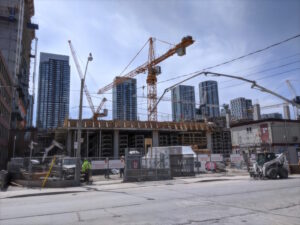
Re/Max Canada predicting condo slowdown
By Adam Freill
Construction ResidentialEconomic environment having negative impact on sales levels as well as new condominium construction in most major Canadian markets.
Economic headwinds have condo sales falling in most large Canadian markets, says Re/Max Canada in its recently released RE/MAX 2023 National Condominium Report. The real estate firm says that the potential for further interest rate hikes and rising costs of living are signalling the end of a short-lived bounce in condominium activity in major markets across the country. This slowdown is not only impacting re-sale units, but is also resulting in a growing number of assignment listings, as well as delayed or cancelled new construction units.
The RE/MAX 2023 National Condominium Report examined close to 100 communities in seven major centres, including Greater Vancouver, Fraser Valley, Calgary, Edmonton, Greater Toronto Area, Ottawa and Halifax-Dartmouth. The report found that despite stronger condominium sales in May, June, July and August of this year, overall sales in the condominium segment fell in all but two markets in the first eight months of 2023, compared to 2022.
The lone bright spot was Alberta, as sales in Calgary climbed a substantial 22 per cent, and Edmonton saw a three per cent year-over-year rise. Higher borrowing costs, combined with the minimum qualifying rate of two per cent added by the stress test, contributed to lower condominium market share in three of the seven markets, including Greater Vancouver, Fraser Valley, and Ottawa.
“It’s really a mixed bag of results in markets across the country when it comes to condominiums this year,” stated Christopher Alexander, president of RE/MAX Canada. “While there was some momentum in the market early in September that dovetailed with the Bank of Canada’s announcement to pause interest rate hikes, the most recent inflation numbers extinguished the flame. Lifecycle sales will continue to contribute to steady activity, but a comeback similar to that of the second quarter is likely out of the question.”
In the country’s largest condominium market of Toronto, a sizable uptick in new listings in August contributed to growing concerns. Toronto’s apartment inventory rose almost 24 per cent year-over-year while townhouse stock saw a more moderate increase of 7.5 per cent.
New listings of apartments in the Fraser Valley also soared, up 27.9 per cent in August, compared to August of 2022. Modest increases were also noted in Edmonton and Halifax.
Interprovincial migration was a significant factor in Alberta as affordability and a lower cost of living proved irresistible to buyers in more expensive provinces – namely Ontario and British Columbia. Both provinces registered a decrease in in-migration in the first quarter of 2023, according to Statistics Canada Quarterly Demographic Estimates, Provinces, and Territories. While Ontario welcomed 125,000 international migrants in Q1 2023, the province registered a decline of 14,732 in interprovincial migration. Out-migration was the largest on record since 2000.
The biggest winners were Alberta, welcoming 35,932 new international migrants and 15,786 interprovincial migrants, the highest level since 2000, and Nova Scotia, attracting 7,636 new international migrants and 2,690 interprovincial migrants.
“The cost of living is out of control in larger centres and even the most affordable housing now carries a pretty substantial sticker price,” stated Alexander. “Earnings have not kept pace with housing costs and inflation continues to stretch household budgets thin. Taxation is also an issue, with the City of Toronto gearing up to introduce an even more punitive Municipal Land Transfer Tax in January of 2024. Is it any wonder why buyers are heading west to Calgary and Edmonton or east to more affordable markets such as Halifax?”
Affordability remains a top concern in most markets across the country. Despite some softening in overall values, the RE/MAX report found that carrying costs are proving prohibitive for many buyers at today’s interest rates.
At the upper end of the price spectrum, however, the luxury condo market remains healthy in Toronto and Calgary. That said, activity has slowed at higher price points in Greater Vancouver, Fraser Valley and Halifax. Downsizing buyers who are selling more expensive freehold properties are in large part behind the push for condominiums.
Re/Max says that assignments represent opportunities at present in markets like Greater Vancouver, Fraser Valley and the Greater Toronto Area as many presale buyers active three to four years ago have found that they no longer qualify for mortgages at new interest rate levels. With their purchases nearing completion, many are looking to sell (or assign) their condos to new purchasers, in the hopes of recouping their down payments and possibly some equity gain.
With interest rates elevated compared to the past few years, new condominium construction has slowed considerably in most markets, says the report, with many new projects delayed or cancelled. The researchers found that, in some cases, city approvals have slowed the process, but in most cases, the financial viability of the project does not make sense in the current economic environment.
“We do anticipate a softer end to the year, as economic conditions erode buying power and impact consumer confidence,” says Elton Ash, executive vice-president at RE/MAX Canada. “The signs are already evident with inventory building and new projects being delayed or cancelled. Savvy buyers will find some opportunity in larger markets, and although some further softening in values is anticipated in most centres, the impact will be somewhat tempered by the tight rental market and continued population growth. Look for condominium sales to rebound in the second or third quarter of 2024.”





